Amsterdam-Based B Corp Plastic Whale Born From Environment-Minded Canal Cleanups
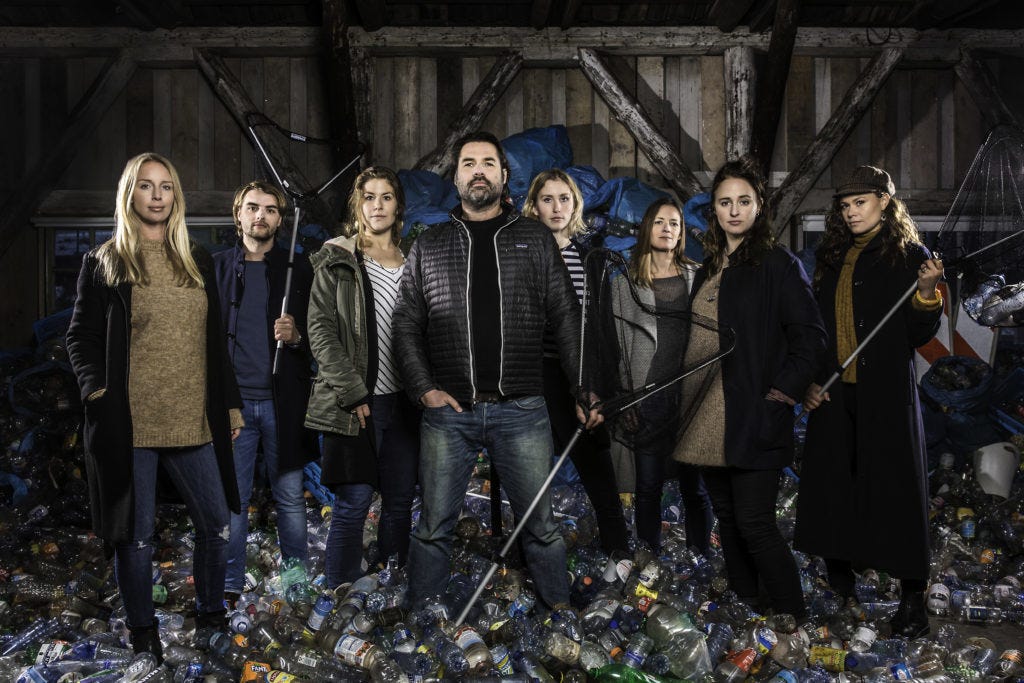
Plastic in the water is one of the biggest growing threats to our planet. The percentage of plastic in our oceans, lakes, rivers, canals and waterways is reaching a level that is no longer sustainable, endangering our precious marine ecosystems and ultimately affecting our food chain. If this situation continues to progress at its current rate, the consequences will be paradigm-altering.
As with many other issues of importance in today’s world, there is a lot of talk about this problem but little action. Marius Smit, CEO and founder of Plastic Whale, however, is someone who is choosing action over words. His initial action was starting Plastic Whale, the world’s first professional plastic fishing company, in Amsterdam. This project was a success, and now he and his team are taking things even further. Plastic Whale became a Certified B Corporation in 2018.
Read on for more about Smit’s company and its groundbreaking projects, including fishing for plastic in Amsterdam’s canals and upcycling plastic collected in the canals, and his idea to replicate Plastic Whale in other places around the world.
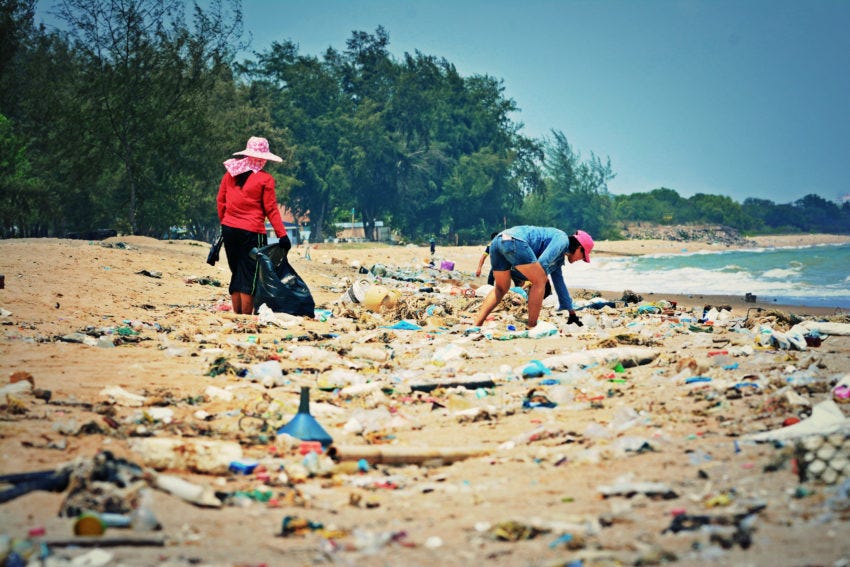
What is the story behind Plastic Whale?
Marius Smit: I started Plastic Whale seven years ago by myself without any business model or plan. All I had was a strategy based upon a few convictions. First of all, I believed there were many people with the desire to contribute to make a change in our beautiful world, but they didn’t have a way to do it; people that wanted to see progress and solutions rather than listening to bad news; people who also aimed to be part of the solution but did not know how to become part of it.
I also thought it was necessary to take action against the problem of plastic in the water. I knew this was a serious issue and it would probably become a lot more concerning in the future. It would definitely not go away in a couple of years.
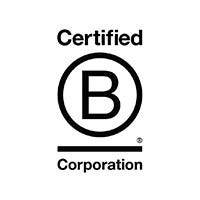
Certified B Corporations like Plastic Whale meet the highest standards of positive impact on society and the environment. Learn what it means to be B Corp certified.
My other conviction was that companies were — and are still — under more and more pressure to actually do good, rather than just talk about doing good but with no evidence of their positive actions. Members of companies are normally stuck in meetings, business plans, and brainstorm sessions, which means that there is a huge gap between them having an idea and them doing something.
My strategy, based on those beliefs, was to create what I call a “man on the moon.” In 1961, U.S. President John F. Kennedy created a challenge to put a man on the moon — something that at that time was considered impossible. It became relevant because of the space race against Russia and because this idea excited people and created a movement that united all those who wanted to make the impossible possible.
Talking about plastic in the water, I’m not so much interested in the problem itself; I care more about the solution. I want to create and innovate with people who want to do the same. I knew that if I had my “man on the moon” it would create a movement of citizens, which would eventually include governments and institutions, and that we could work together toward a solution.
When I launched my initiative seven years ago, it sounded like I wanted to build a boat made of plastic waste. At that time, I had never driven a boat, nor did I know how to build one. This was my “man on the moon” challenge. My background is actually in marketing and strategy, so I knew nothing about plastic, sustainability or boats. I simply had my convictions and they turned out to be right, because as soon as I made public my “man on the moon” I was contacted by all sorts of people wanting to help me.
The interesting part was they were all specialists within their own fields: I spoke with boat designers, recycling companies, boat builders, accountants, lawyers and PR companies. They were all willing to help me for free, and this is how Plastic Whale started.
At that moment, I had new colleagues and I told them we should start doing things immediately. Speaking with interesting people about the plastic problem was important, but it was not the solution. We decided to arrange some boats; we all brought friends, food and drinks, and went plastic fishing in the canals of Amsterdam. We called this initiative “the old-fashioned plastic fishing,” and this name made it sound like it has been done for years in Amsterdam.
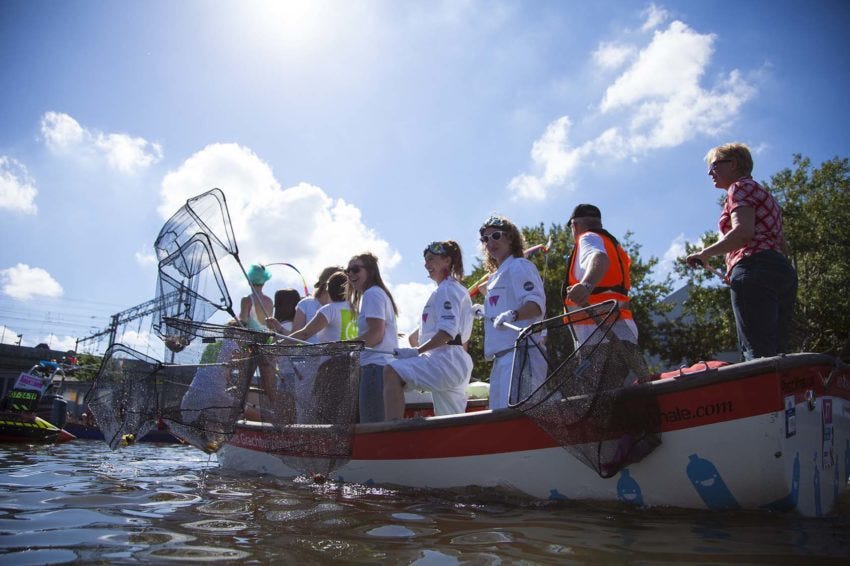
We never thought many people would interested in it. We thought if 50 people turned up on 10 boats, it would be a success. It actually turned out to be 450 people on 33 boats for the first year. The next year we had 1,200 people on 72 boats. We became very popular, and companies approached us because they wanted to go plastic fishing as a corporate event as well.
This turned out to be a very smart idea because, through this, we created the basis of our business model. So far, we have been fishing with more than 300 companies in Amsterdam; it is incredible, and the months of June and July are filled with plastic fishing events. People like to be a part of something positive, to feel like they are involved and that they are moving forward.
People are tired of simply talking about problems; they want to create change together.
Four years ago, we presented our first plastic fishing boat made with Amsterdam canal plastic. Now we have a fleet of nine. We pick a lot of plastic from the canals, but we keep the PET bottles separate and we use those bottles as row material for our boats. We fish for plastic so we can build more boats, and we then have more boats to fish for more plastic.
The idea of plastic fishing in the canals is so simple, yet it is a very rewarding experience. There are always people around applauding and thanking those who are plastic fishing. All the participants go back home with a very good feeling.
I like the concept of making a business out of the plastic waste. I have also seen on your web page that you are starting to produce pieces of furniture made with the plastic from Amsterdam’s canals. Can you tell me more about this?
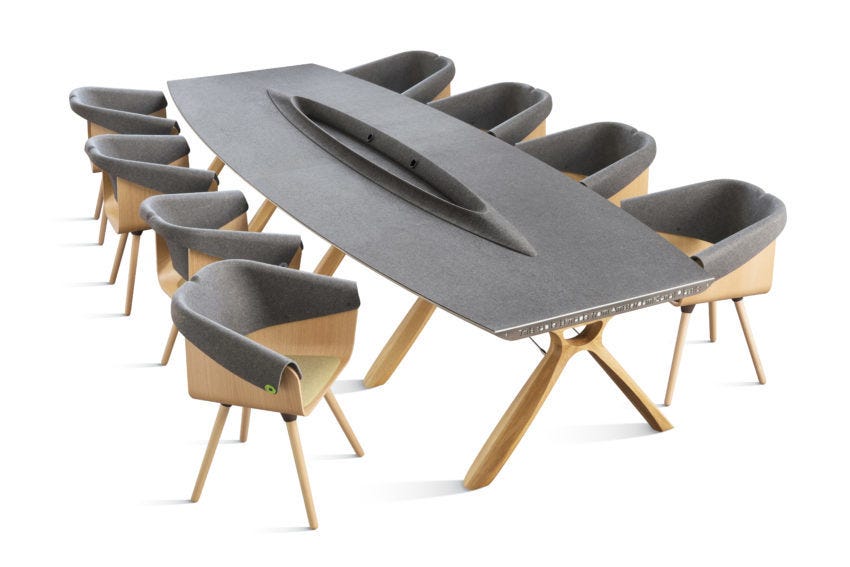
Smit: A year ago, we were having lunch at our table and realized that the table was too small for all of us given the huge growth of our Plastic Whale team. At that moment, someone from the team pointed out that we could have built a table from the same plastic we use for our boats. I loved the idea, and I started thinking about all the companies that wanted to do something for the issue of plastic and to promote a circular economy. Most of them did not have any idea how to do it. My idea was: “Why don’t we make high-end office furniture made of plastic from Amsterdam’s canals for them?”
As of now, we have 14 launching partners. This means 14 organizations have ordered our pieces of furniture, and we are already talking with some of them about bigger projects as well. At the moment, we are getting a lot of attention from all over the world, and my idea is that we are going to further develop our portfolio so that we can offer new products as well.
This is a high-end material, and we want to create products for a broader market as well. Now we are selling to companies; in the future we might produce for individual consumers. We have developed our pieces of furniture at a very fast pace: In only five months we have developed four products. It normally takes a year or two for such progress. We have so much demand and our business is growing so fast, we simply need to make sure my team and our partners can keep up with it. This is why we are taking this step by step.
Are you also planning to export this same Plastic Whale model to other cities?
Smit: We create economic value from plastic waste, and we sincerely hope as many people as possible can get involved. There are many people that want to do what we are doing in Amsterdam locally. We have been contacted by people from Melbourne, Singapore, India, Miami and California. We are now looking at the right way to develop this further, as you can’t copy the exact same initiative everywhere.
This article was originally published by Impakter.com. B the Change gathers and shares the voices from within the movement of people using business as a force for good and the community of Certified B Corporations. The opinions expressed do not necessarily reflect those of the nonprofit B Lab.

The Business of Fishing for Plastic Waste and Saving the Planet was originally published in B the Change on Medium, where people are continuing the conversation by highlighting and responding to this story.
Source: B the Change
